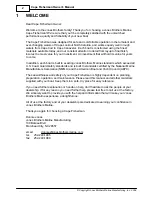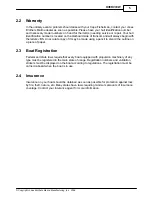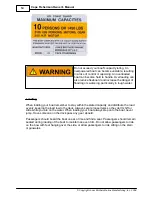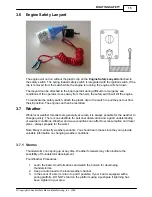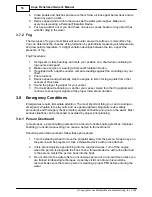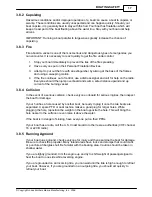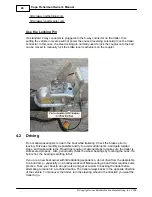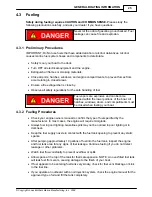
Cape Fisherman Owner's Manual
10
© Copyright Jones Brothers Marine Manufacturing, Inc. 2008
3.2.2 Overtaking/Passing
In overtaking and passing situations, the boat being passed has the right of way, the
passing boat is required to stay clear.
3.2.3 Meeting Head-On
When meeting head-on, neither boat has the right of way. Both boats should keep to their
right and pass on the left. However, if both boats are on the left side of the channel, each
vessel should sound two short blasts of the horn and pass on the right sides.
3.2.4 Crossing Situations
In crossing situations, the boat on the right has the right of way. It must hold its course and
speed. The other vessel must slow down and stay clear until the other vessel has passed.
Boats going up and down a river have the privilege over boats crossing the river.
3.2.5 Warning Signals
The following warning signals and their meanings are commonly used by vessels on the
water. Common sounding devices include horns or whistles.
ONE LONG BLAST
Warning signal - coming out of slip
ONE SHORT BLAST
Pass on my port side
TWO SHORT BLASTS
Pass on my starboard side
THREE SHORT BLASTS
Engine in reverse
FIVE OR MORE BLASTS
Danger Signal
3.2.6 Drugs and Alcohol
DO NOT use drugs or alcohol while boating. The operation of a motorized vessel while
under the influence carries a significant penalty and is strictly enforced by the U.S. Coast
Guard, state and local law enforcement agencies. The use of drugs or alcohol will decrease
your reaction time, impair your judgment and keep you from safely operating your boat.
3.3
Required Safety Equipment
The US Coast Guard (USCG) requires that every boat have specific equipment on board.
Refer to the US Coast Guard publication CG-290 for more information on Coast Guard
required safety equipment. Some local regulations request more equipment than this list of
the USCG requirements:
3.3.1 Fire Extinguisher
Every boat should be equipped with a fire extinguisher that is approved for marine use. It
should be classified to extinguish Type B (gasoline, oil or grease) fires. Your fire
extinguisher should be readily available. Passengers should be informed of its location and
proper use. Check extinguisher periodically for status of charge.
If your fire extinguisher has a charge indicator on the gauge, cold or hot weather may have
an affect on the gauge reading. Consult the instruction manual supplied with the fire
extinguisher to determine the accuracy of the gauge.
Содержание Cape Fisherman
Страница 1: ...Cape Fisherman Owner s Manual...
Страница 6: ......
Страница 7: ...WELCOME Part I...
Страница 9: ...OVERVIEW Part II...
Страница 12: ......
Страница 13: ...BOATING SAFETY Part III...
Страница 26: ......
Страница 27: ...GENERAL BOATING INFORMATION Part IV...
Страница 37: ...OPERATION Part V...
Страница 55: ...MAINTENANCE AND SERVICE Part VI...
Страница 61: ...WINTERIZATION AND STORAGE Part VII...







